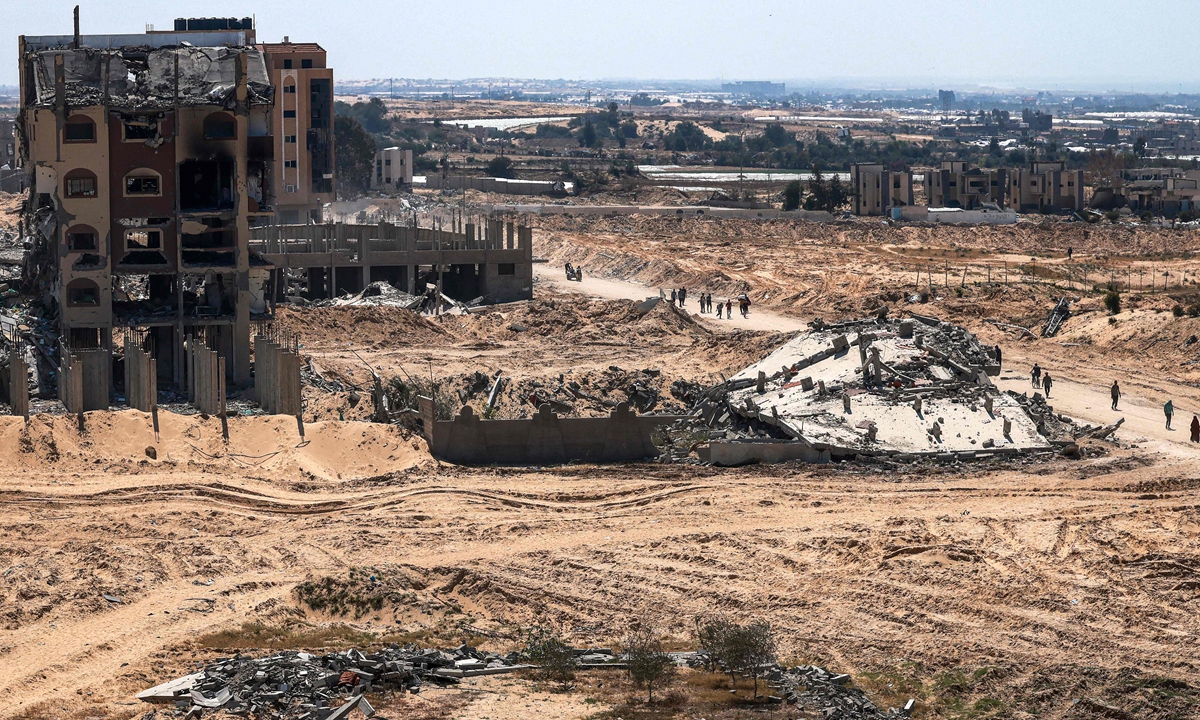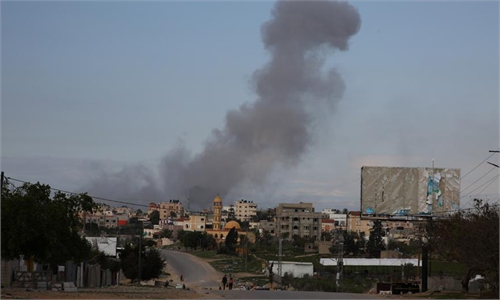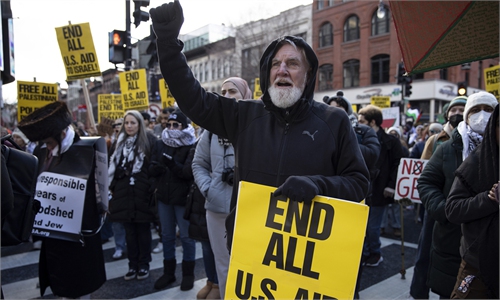Troop withdrawal from Gaza reflects severe challenges, complex dilemmas Israel is facing

People walk past damaged and destroyed buildings in Khan Younis on April 7, 2024, after Israel pulled its ground forces out of the southern Gaza Strip. Israel pulled all its troops out of southern Gaza on April 7, including from the city of Khan Younis, according to the Israeli military and media reports.Photo: VCG
The reported withdrawal of Israeli troops from southern Gaza could reflect that Israel is facing severe challenges and a complex dilemma under immense internal and external pressures, especially with the mounting risks of conflict with Iran following the military's deadly attack on Iranian embassy compound in Syria, according to Chinese observers on Monday.
Israeli troops were withdrawn from southern Gaza in preparation for a possible operation in the city of Rafah, Israeli Defense Minister Yoav Gallant confirmed on Sunday, Xinhua News Agency reported.
Israel withdrew all ground troops from southern Gaza except for the Nahal Brigade, which remains in central Gaza, splitting the Strip in two and preventing the return of civilians from south to north of Gaza, Xinhua reported. An Israeli brigade is typically made of a few thousand soldiers.
The sudden withdrawal action is widely believed to be in response to potential retaliation from Iran following the deadly attack on its embassy compound in Syria by the Israeli military on the April 1. This round of Israeli-Palestinian conflict, already lasting more than six months, has not only plunged the Gaza Strip into a severe humanitarian crisis, but also severely impacted the Israeli economy, leading to a sharp deterioration in the business environment and a surge in government spending, observers pointed out.
Despite the Israeli military stating that the withdrawal aims to prepare for following missions, the timing and context of Israel's withdrawal are evidently delicate and complex, Liu Zhongmin, a professor at the Middle East Studies Institute of Shanghai International Studies University, told the Global Times on Monday.
Recent major events surrounding the conflict and its spillover include the UN Security Council's adoption of a cease-fire resolution for Gaza, large-scale protests in Israel with tens of thousands of participants, Israel's attack of the Iranian embassy compound escalating the risk of conflict, Israeli forces killing several international aid workers, and the escalation of conflicts between Hezbollah and Israel in Lebanon, Liu said. "Therefore, Israel's withdrawal in this context reflects the severe challenges and complex dilemma it faces under immense internal and external pressures. Even though the possibility of Israel launching military operations in southern Gaza in the future cannot be ruled out, its deepening predicament is hard to conceal."
Israel's withdrawal from southern Gaza coinciding with preparations to confront Iran is not coincidental. The withdrawal was originally a gradual process but has now accelerated, likely due to the worsening regional situation over recent days. This large-scale withdrawal is mainly in response to possible retaliatory actions from Iran, a military expert, who requested not to be named, told the Global Times on Monday.
Israel's bombing of the Iranian embassy failed to achieve the desired goal of restraining the US, exacerbating US-Iran tensions, and intensifying US-Iran confrontation. Although the US fundamentally won't change its support for Israel and the alliance relationship between the two, Israel's recent actions have clearly disrupted the international strategy, Middle East policy, and domestic elections of the Biden administration. The abstention vote cast by the US at the UN Security Council, to balance various needs, is to some extent a turning point in US policy adjustment in the new round of Israeli-Palestinian conflict and one of the important reasons for Israel's decision to withdraw troops to de-escalate the conflict, he said.
The White House, commenting on the partial withdrawal, said it was likely to be an opportunity for troops to "rest and refit".
"They've been on the ground for four months, the word we're getting is they're tired, they need to be refit," White House's National Security Spokesman John Kirby said.
The Sunday withdrawal of troops from Southern Gaza also took place following what media called the worst week since the Hamas attack on October 7, 2023 for Israel's prime minister Benjamin Netanyahu.
Protests against the longtime Israeli leader by the families of hostages and the opposition returned with a vengeance across the country as he spent two nights in hospital for hernia surgery. Then his major political rival, Benny Gantz, undermined the unity of the wartime government by calling for early elections; Netanyahu's ultra-Orthodox coalition allies are already angry with him over a row regarding military conscription, the Guardian reported on Sunday.
Israel's political, economic, social, diplomatic crises continue to deepen. The unprecedented wave of protests by Israeli opposition parties and the public against the Netanyahu government has reached a recent peak, with protests erupting in major cities like Tel Aviv and Jerusalem, demanding the resignation of the Netanyahu government, holding elections, and quickly reaching agreements to rescue hostages, with even riots breaking out. If allowed to develop, not only will Israel's objectives in Gaza become increasingly distant, but the possibility of triggering a "Jerusalem Spring" due to the Gaza conflict cannot be ruled out, analysts said.
The severe economic contraction, profound social division, deep security crisis, souring international image, and deepening international isolation have put Israel on the verge of public anger eruption at any moment, they warned.
At the same time, Biden has also reportedly issued a stark warning to the Israeli leader on Thursday via phone call that the future US support for Israel's Gaza war depends on the swift implementation of new steps to protect civilians and aid workers, the CNN reported.
Biden's message marks a sharp change in his administration's steadfast support for Israel's war efforts, with the US leader for the first time threatening to rethink his backing if Israel doesn't change its tactics and allow much more humanitarian aid into Gaza, per the report.
Israeli Prime Minister Benjamin Netanyahu on Sunday blamed Hamas for the impasse in negotiations, saying the group's demands were extreme because they would end the war permanently and leave Hamas intact, the WSJ reported.
He said that despite heavy international pressure on Israel to agree to a cease-fire, Israel would only do so if the hostages are released.
"Israel is ready for a deal, Israel is not ready for surrender," Netanyahu said. Hamas, in turn, has accused Israel of not compromising for a deal.




